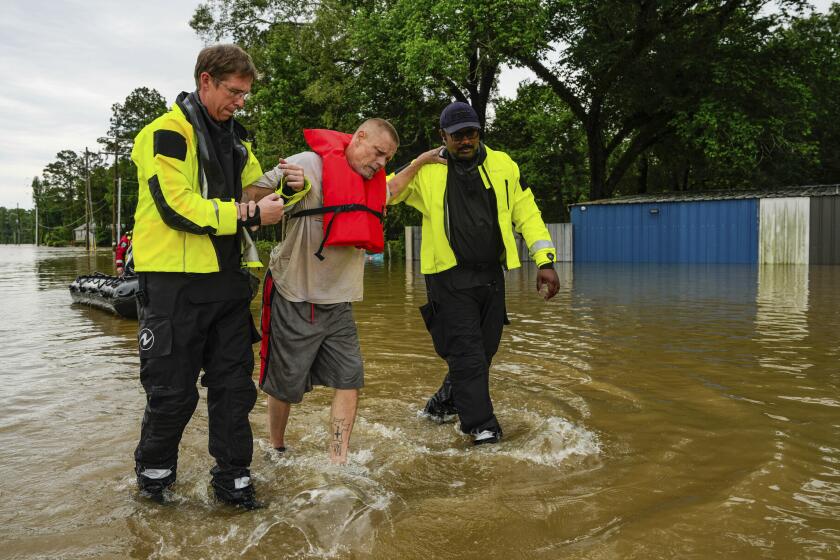Harvest Hits Home in the Drought-Stricken Grain Belt : Cursed by the Dry Year, Farmers Battle Despair
It was the summer of the Great Drought, the worst dry spell since Dust Bowl days; the ground baked, crops sagged and hopes withered under the blistering sun. With autumn’s arrival, many farmers face a bitter harvest, wondering if they have produced enough to keep them on the land another year. For a few fortunate farms where rain has fallen, it will be a bountiful harvest, a time to celebrate one of the best years ever. Side-by-side stories look at two counties in Iowa at harvest time: Carroll, blessed by rain, and Washington, cursed by drought.
The silver moon has barely faded from the pre-dawn skies when Bruce Watson leaves his dusty gray fields and withered corn crop for a 31-mile bus trip. It is the price he is paying for the drought.
Farmer Watson is driving a school bus this fall. He is also a part-time carpenter and was a janitor briefly, too--juggling jobs to make ends meet and keep his family on the farm.
“This is a bad time,” the 43-year-old farmer said softly, examining a sickly corn ear, its golden kernels coated with green mold. “We’ve had too many bad times since 1983. . . . It’s darn depressing.”
The summer of the Great Drought has turned into the fall of Great Despair. For months, rain didn’t come down, crops didn’t come up, temperatures soared and hopes fizzled. Now, thousands of farmers face a bitter harvest. Watson has lost two-thirds of his corn, half of his beans and much of his optimism.
“When a drought hits you, and you’ve got one-third to sell, it’s like you’re giving back two-thirds of your wages,” said the third-generation farmer. “That’s what we’re trying to survive on. Could you do that?”
“Everything we have to pay for is not going to come down because of the drought,” he added. “Taxes aren’t going to come down. . . . Your chemical costs won’t come down. . . . The vet’s going to charge me the same.”
Watson’s plight is common in the Farm Belt, climbing out of one of the worst droughts since Dust Bowl days. Already, the government has grim predictions: The nation’s corn crop will be down 37% from last year’s bumper harvest, soybeans will drop by 23%, wheat by 14%.
In Iowa, in which 91 of 99 counties have been declared drought disaster areas, the corn crop will be the smallest in 24 years--811.2 million bushels. Washington County recorded its driest year this century--barely 43% of normal rainfall by mid-September, for a 15-inch “debt”--and most of the rain came too late for crops already hurt by the dryness and withering heat.
For the 21,000 residents of this predominantly agricultural county, less money to spend creates more anxiety for merchants. Sixty percent of Washington’s economy is tied to agriculture.
“We depend on the farmer,” said Carlton Mangold, who owns a TV and appliance store. “When he makes it, we make it.”
“There’s been a very severe ripple effect,” said Cohen Bond, city clerk. “Our businesses are hurting. It’ll probably continue for some time.”
Some aid is on the way in the form of the government’s $3.9-billion drought-relief package. Experts say at least $400 million should make its way to Iowa.
The kindness of strangers will help a bit. The city of Jacksonville Beach, Fla., after reading news reports, adopted Washington as a sister city and held a Sept. 17 fund-raising concert. The amount raised has not been announced.
“The Farm Belt has been the bread basket of the nation--when they get hurt, it hurts the whole country,” explained Jacksonville Beach Mayor Robert O’Neill. “Someday we may have a hurricane and we may need (help) back.”
Farmers certainly weren’t seeking help at the start of 1988.
“They were on a roll,” said Jim Frier, county extension director. “They had high hopes of a fantastic year.”
But from March through July, the county received less than 30% of normal rainfall. The black earth cracked and turned gray. Grasshoppers grew big. Crops didn’t.
“Farmers stood and watched their corn burn out,” Frier said. “They couldn’t do anything. . . . It’s like a person watching their house burn down and the fire department has not arrived.”
Frier estimates that county corn yields will be reduced by almost two-thirds, soybeans by a half. Some farmers, he said, may not have feed for their animals next year. Washington County produces enough pork to feed 1.5 million people each year.
The farm crisis, originally fueled by debt, high interest rates and declining land values, had already taken a toll. Frier said up to 10% of county farms have been liquidated since 1980.
Watson, who farms 160 acres, is a survivor. Now he faces another test.
“My wife says this year won’t be bad, but what are we going to do next year?” he said. “Next year, there won’t be any money to put the crop in.”
Watson, who worked for a telephone company before he began farming 13 years ago, hopes hard work will help.
Holds Three Jobs
His wife, LeAnna, is a part-time bookkeeper. He holds three jobs, rising at 4:30 a.m. to drive his bus route, sandwiching in farming and carpentry work.
Setting priorities is a problem.
“It hurts me to go to work when I’ve got work here,” he said. “I just get tired every day I’m working. Do I go help the neighbors, do I do something here, do I spend time with the family? . . . I guess I wonder why I’m doing it. I wonder why I quit a bigger company and came back. At that time, I thought farming had a bright future. Now, I’m not going to promote farming to my son.”
Watson said he is more relaxed than he was during the summer’s nail-biting days and sleepless nights, when he fretted about his daughter’s college scholarships and finding a baby sitter for his 7-year-old son.
“I worried about things too much,” he said.
But he had reason. Watson, who has no crop insurance, bought 40 acres this year and spent $25,000 to buy a corn-drying bin and build a machine shed.
“I had dreams of filling the new bin and having corn left over,” he said. “With all my crops, I probably won’t have it a quarter full.”
Watson admits that hard times have forced him to re-examine his way of life.
‘Are You a Failure?’
“You wonder, are you a failure? I guess you can’t blame it on yourself,” he answered quickly. “Some people say you’re a poor manager. I don’t think I’m a poor manager. I made the wrong decision in the wrong year. I couldn’t foresee a drought.”
The Watsons will stay put. “As of now, we’re going to farm another year,” he said. But without moisture this fall and winter, he added, “I’m not the only one who might say, ‘Leave the seed in the bag. Don’t pay to put it out there.’ ”
Still, folks are looking ahead--with optimism.
“Everybody went into the summer thinking this was going to be a great year,” Bond, the city clerk, said. “It didn’t turn out that way. . . . We’ve chalked this up as a lost year.”
More to Read
Start your day right
Sign up for Essential California for news, features and recommendations from the L.A. Times and beyond in your inbox six days a week.
You may occasionally receive promotional content from the Los Angeles Times.






